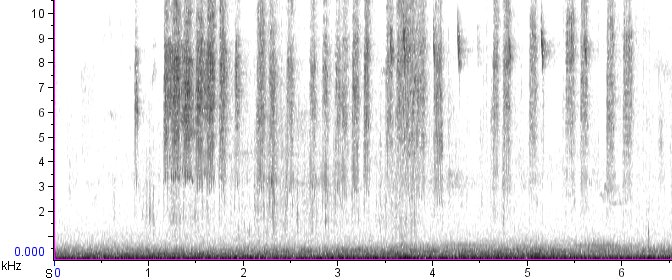A Brown-headed Stepchild
Last weekend in Minnesota I observed a juvenile Brown-headed Cowbird (Molothrus ater) being fed by a much smaller adult Chipping Sparrow (Spizella passerina). I’ve known for years that cowbirds are brood parasites, which means they lay their eggs in other birds’ nests and leave the job of child-rearing to unwitting foster parents. But this was the first time I’d actually seen it, and heard the cowbird’s begging calls:

Full disclosure: I didn’t actually record the Chipping Sparrow’s foster child; the above recording was made the following day, when I chanced upon another fledgling cowbird, this one being fed in underbrush by a parent I never identified.
Hearing two begging cowbirds in two days got me thinking. How important are begging calls to parent birds? What if the begging of the cowbird sounds nothing like the begging of its foster parents’ biological chicks? Is it less likely to be fed?
Because brood parasitism is such a fascinating phenomenon, one with significant implications for both evolutionary theory and for endangered species management, it has been extensively studied. Some brood parasites apparently mimic their host species in both sight and sound, presumably so that the foster parents will be more likely to accept them, but according to Lorenzana & Sealy (1996), Brown-headed Cowbirds do not do this. Over 140 bird species have been known to successfully raise Brown-headed Cowbird chicks, but those chicks always sound like typical cowbirds.
As the Fledgling Project makes clear, baby birds of different species can sound completely different. Therefore, it would seem that parents who respond preferentially to chicks of their own species would have an evolutionary advantage over those who respond willingly to cowbird chicks. It’s been shown that the begging of cowbird chicks tends to be both louder and more frequent than the begging of their non-cowbird nestmates, and it’s been suggested that having a cowbird chick in the nest makes the nestmates change their calls in response, but as far as I can tell, researchers haven’t yet directly tackled the question of differential parental response to Brown-headed Cowbird chicks based on their vocalizations.
Anyone looking for a research project?
One thought on “A Brown-headed Stepchild”
And how does this generalized ability to recognize begging birds by adults of other species play a part in the regular-but-rare phenomenon of brood adoption?
Comments are closed.